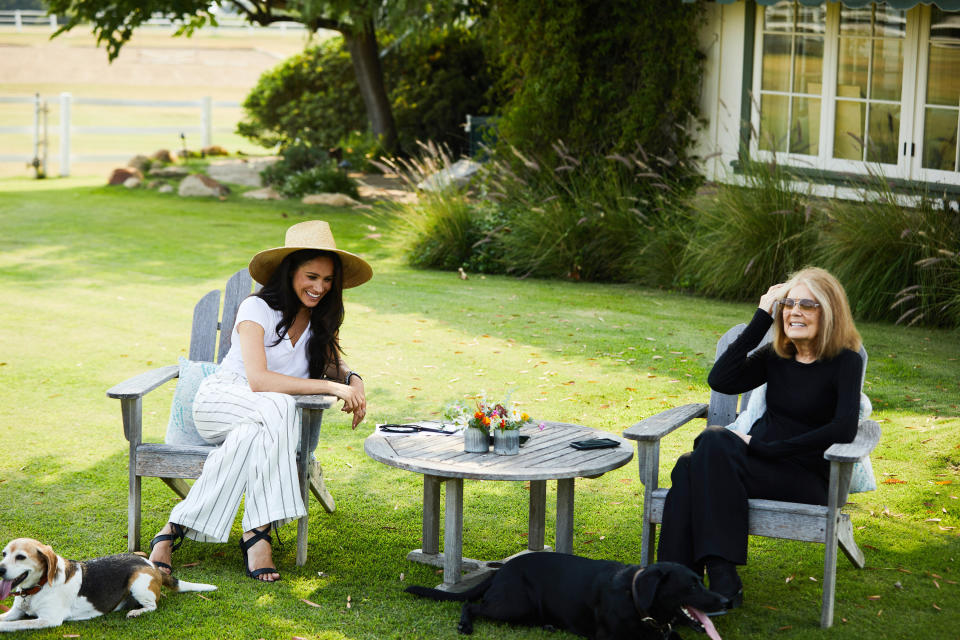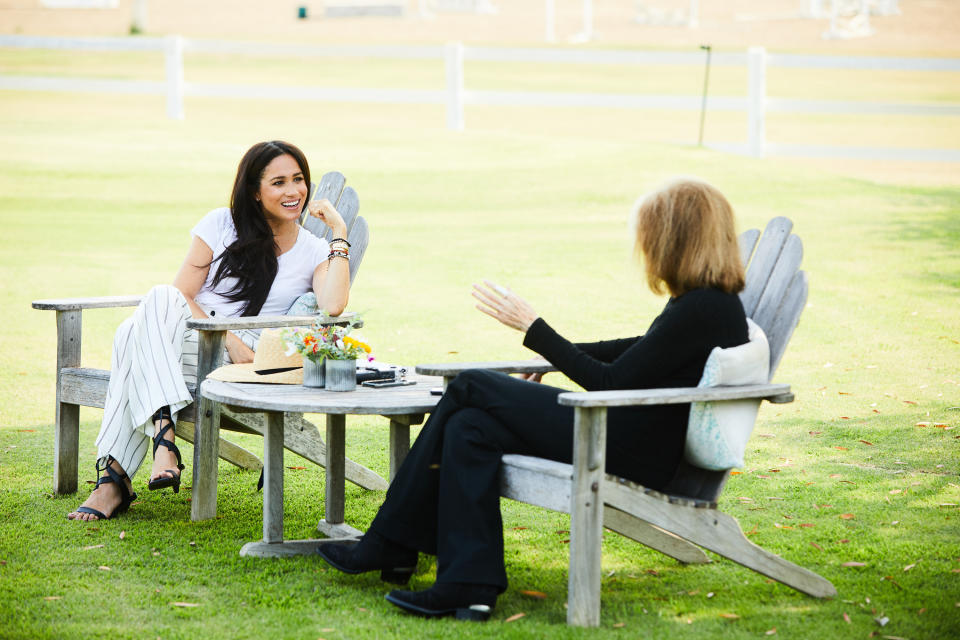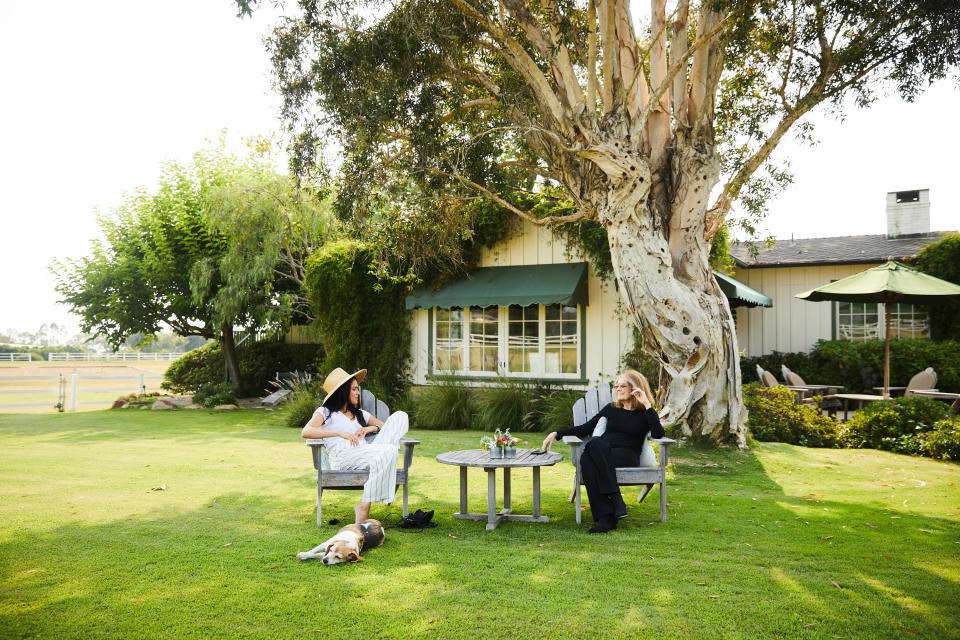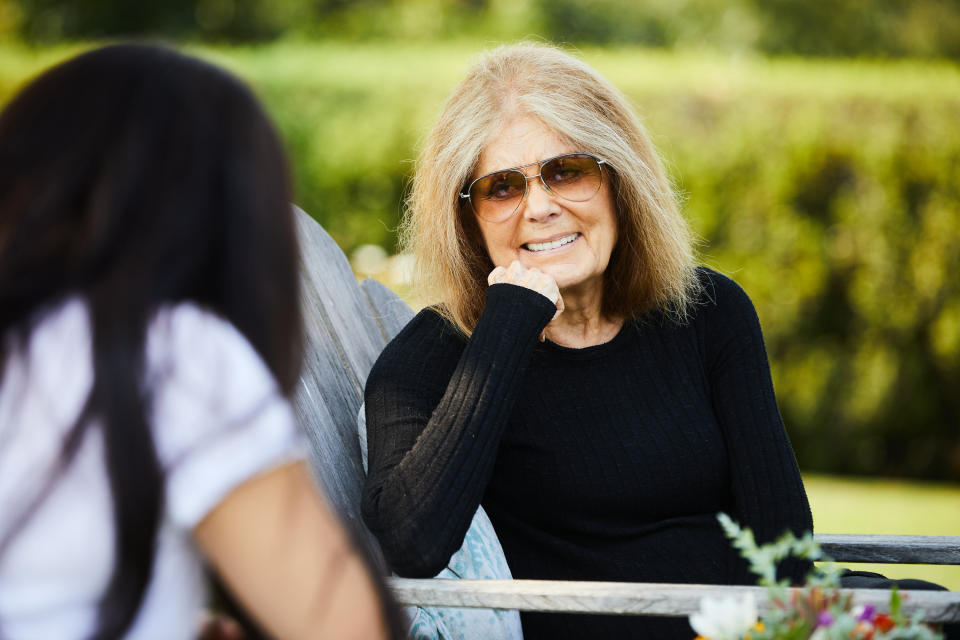Meghan, The Duchess of Sussex: My conversation with Gloria Steinem
“If you don’t vote, you don’t exist.”
These words from Gloria Steinem have stuck with me since she first spoke them during this conversation.
Throughout our friendship, we’ve spoken of our shared beliefs surrounding women’s rights, the need for representation and the very timely conversation on voting.
I firmly believe that we vote to honor those who came before us and to protect those who come after us. Ms. Steinem, my friend Gloria, is one of the women I honor when I vote.
I hope you enjoy our conversation as much as I did and that it allows you to reflect on who inspires you to vote as we approach this upcoming election. Your voice matters. Please use it.

Gloria Steinem: Welcome home. I’m so glad that you’re home!
Meghan, The Duchess of Sussex: Me too. For so many reasons. We’ve talked a lot these last few weeks. I keep thinking my goodness — I’ve looked up to you for so long! It’s wonderful to just be in your company, to learn so much and to feel inspired to be home. But also to help people remember why it’s so important to vote.
G: Really, we’ve been rescued by women of color in all of our recent elections because of a vote of conscience and compassion. The heart of the Democratic party has been Black women, actually, and now there is a potential Vice President who is Black and that’s exciting.
M: I’m so excited to see that kind of representation. You know, for me, being biracial, growing up, whether it was a doll or a person in office, you need to see someone who looks like you in some capacity. As many of us believe, you can only be what you can see. And in the absence of that, how can you aspire to something greater than what you see in your own world? I think maybe now we’re starting to break-through in a different way. Do you feel hopeful?
G: Oh yes, I do feel hopeful. We still require an adjective, if you know what I mean. There are ‘doctors’ and ‘women doctors’ and ‘Black women doctors’ and ‘Hispanic doctors’ … the noun still tends to be confined to the ruling group. But we’ll get past that.
M: You know it’s so interesting. I was reading this book called Algorithms of Oppression by Safiya Noble and it talks about how the digital space really shapes our thinking about race. For example, it wasn’t that long ago that when you’d start to type in a search engine ‘why are white women…’ it would start to autofill with words like ‘so pretty’ or ‘so beautiful.’ And then when you would type ‘why are black women…’ it would autofill with words like ‘so angry’ or ‘so loud.’ You get to see how our minds are being shaped by something so much bigger than what we’re actually feeling or putting out there.
G: That’s terrible isn’t it? In a way, the computer age has made it clear by listing it so we can fight it more easily. ... I wonder if the COVID-19 disaster — which is an unmitigated suffering and a very unequal suffering, I must say — is teaching us something because it doesn’t recognize race, gender or nationality. It sees human beings as human beings. And perhaps we’re beginning to see that too.
M: On top of that, it’s just giving everyone this moment of reset; to reevaluate what actually matters. I think it’s often forgotten how women like you and so many others before you fought for us to just be where we are right now.

G: If you don’t vote you don’t exist. It’s the only place where we are all equal: in the voting booth. We not only have to vote but we have to fight to vote. You know what worries me the most are young people who I understand are the least likely to vote. And I can understand the feeling that they don’t think they have an impact. Yet, it’s more important that they vote more than anyone else because they’re going to be alive long after I am. And they are going to be suffering the consequences. So I hope that each one of us goes to our neighbors, even if it’s online, and asks, ‘Are you voting?’
You know, I fear we get a case of the ‘shoulds’ — the ‘what should I do?’ as opposed to ‘I’m going to do everything I can.’ We should ask ourselves: ‘Who do I talk to every day? Are they registered or not?’ Whatever it is that is next to us we can do. If we each do that, then I think we’ll be OK.
If you don’t vote you don’t exist. It’s the only place where we are all equal: in the voting booth. Gloria Steinem
M: I’ve been really concerned about voter suppression. We can already see all the different challenges that we’re facing. I had the chance to speak with Stacey Abrams about this to try to get a better understanding of what to do, for example, if you’re a person of color and you’re in line, for potentially hours on end, and during that time someone tries to intimidate you to tell you that you should get out of line because you might be under surveillance or any number of intimidation tactics that are so scary.
And then you think: ‘You know, it’s not worth it.’ You decide to step out of line and relinquish your right to vote. That’s bad enough, but then there’s a ripple effect because whoever is in the back of the line says, ‘Whatever they did to them…I don’t want that to happen to me.’ That, I think, is so frightening. But I wonder how we circumvent that and how we get people to feel empowered.
G: Just people hearing you say that will help them be better prepared for it. I remember standing in lines in Florida that were eight hours long and that was a form of voter suppression. I was not voting. I was there to encourage. Because if you have young kids, how are you going to do that? But the result of that realization was that in the next voting opportunity people were saying, ‘I’ll take your kids. I’ll drive you to the polls. We’ll move the polls closer to your neighborhood.’ It really is one step at a time.
M: And as women, there are so many things that are affecting us right now. You have been carrying the torch for so long.

G: I just want to say movements are family. I get to do what I love and care about every day of my life. How great is that? Well, almost every day.
M: Today is a great day.
G: Yea, today is a great day! I get to see you.
M: You’re so sweet. I feel really grateful to be a part of your family because it feels good when you’re doing the right thing. When we had lunch recently and spoke about the 19th Amendment, I remember you were saying, ‘Well of course it’s a recognition, but it’s only the right to vote for white women.’
G: Yes, I think that’s where we’re a little bit wrong with our celebration. We keep saying that women won the right to vote in 1920, which is true, it was the beginning. But Native American women came later, Asian American women came later, African American women only came really mostly with the Voting Rights Act in 1965.
M: I was reading something the other day and it made me think of The Equal Rights Amendment and I’m curious to hear your thoughts on how we can get that over the line. Because it was 1970 that you were in Congress appealing for it, right?
G: Mm-hmm, yes that’s right.
M: So there was a Native Alaskan named Elizabeth Peratrovich who fought for and ensured the passage of the 1945 Anti-Discrimination Act, and she said: ‘Asking you to give me equal rights implies that they are yours to give. Instead, I must demand that you stop trying to deny me the rights that all people deserve.’
G: Yes, I think that that’s very good because we’re not supplicants, right? And, in fact, on the land where we are, before Europeans showed up, there were Native American cultures in which women were equal, in which grandmothers chose the Chief. It was a system of balance and our Constitution is based on that, which we should remember. And it was about a circular idea of consensus, circles of consensus going up rather than hierarchy, which is the source of the linked not ranked.
Gloria references the bracelets she has given Meghan that feature the motto “Linked not ranked.”
M: I love this.
G: Well, you know actually, ‘we are linked not ranked’ is the shortest way I’ve ever found to say what our goal is.
M: It means everything to me on every level; we are linked not ranked.
G: And I thank you for understanding that rank is less important than being linked. That’s a big thing.

M: You shared The Glorias with me, the advanced screening of [the film about your life directed by Julie Taymor]. It’s just such a fantastic way to see the breadth of your life thus far and everything you’ve accomplished, but also understanding where you come from and how you became a feminist. As I’ve gotten older I’ve been able to understand that it’s not mutually exclusive to be a feminist and be feminine. And to own that and harness your femininity and your identification as a woman in all of the different layers.
G: Well, you can be a feminist and be masculine and a guy.
M: Like my husband! I love that when he just came in he said, ‘You know that I’m a feminist too, right Gloria?! It’s really important to me that you know that.’
G: That was wonderful.
M: But you need that. And I look at our son and what a beautiful example that he gets to grow up with a father who is so comfortable owning that as part of his own self-identification. That there’s no shame in being someone who advocates for fundamental human rights for everyone, which of course includes women.
G: And also that he is a nurturing father. Because then your son will grow up knowing it’s OK to be loving and nurturing.
M: Well said. I know it’ll mean a lot to him when I share that.
Gloria, I couldn’t have asked for a better day. This is so important. The next two months are so important. I want to thank you — we all want to thank you — for your wisdom and inspiration.
Edited for length and clarity.



